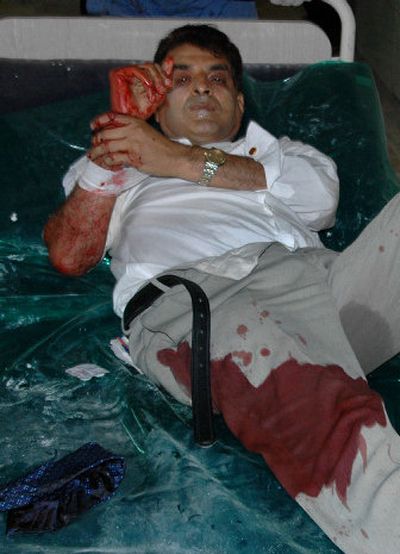Muslim diplomats targeted

BAGHDAD, Iraq – Gunmen attacked two foreign diplomats here Tuesday in what appeared to be a coordinated campaign to kidnap or kill envoys from Muslim nations.
Hassan Malallah Ansari, the top-ranking diplomat at Bahrain’s Baghdad mission, was shot and wounded Tuesday morning when gunmen in a pickup truck tried to abduct him as he was driving alone in the capital’s Mansour district, police said. In the afternoon, Pakistani Ambassador Mohammed Younis Khan escaped injury when gunmen in two cars fired on his convoy in the same neighborhood.
The two attacks came on the heels of the disappearance and apparent kidnapping of Ihab Sherif, chief of Egypt’s diplomatic mission in Baghdad. Tuesday night, a message posted on an Internet forum said that al Qaeda in Iraq was holding Sherif, who was last seen Saturday night and whose vehicle was found Saturday. The claim of responsibility could not be established.
Meanwhile, a spokesman for Iraq’s most influential Sunni Muslim religious group rejected appeals to support a religious decree calling for Sunnis to vote in Iraq’s next election. Isam Rawi, spokesman for the Association of Muslim Scholars, dismissed the edict announced Monday by Adnan Dulaimi, head of the government’s Sunni affairs agency, because it sought to share out political power on a factional basis. Rawi told al-Arabiya television that Dulaimi “should have called for an Iraqi national gathering to include all the sides that oppose the current regime and its call for occupation forces to stay in Iraq for an indeterminate time.”
The attacks on diplomats drew quick denunciation from Iraqi officials, who have encouraged Arab nations and other Muslim countries to establish full diplomatic ties with the country’s new government. Laith Kubba, chief spokesman for Prime Minister Ibrahim Jafari, said the incidents conveyed “the message of terrorism.”
“The mentality of the enemy is to move in the opposite direction” from that of Iraq’s new leadership, Kubba said, “and they realize that Iraq is moving to push for opening embassies.” Sherif was scheduled to become Egypt’s ambassador to Iraq, which would make him the first Arab ambassador accredited to Jafari’s government.
Ansari, the Bahraini envoy, suffered a bullet wound in his right shoulder when gunmen fired on his car, which was not armored and carried diplomatic license plates. The official Bahrain News Agency quoted Foreign Undersecretary Yousef Mahmoud as saying the attack on Ansari was “an attempt to kidnap him.”
After the attack on Khan, Pakistan immediately relocated him to Amman, the capital of neighboring Jordan. “The decision has been taken because of a deterioration in the security situation. … We will review this decision when we detect any improvement in the security situation,” the Pakistani Foreign Ministry told the Reuters news agency.
Russia’s government also said that cars belonging to its Baghdad embassy were fired on Tuesday along the dangerous road between the city and the international airport. A Foreign Ministry spokesman in Moscow, however, said it did not appear that the gunfire was directed at the Russian vehicles, according to news services. And a roadside bomb exploded 50 yards from the Iranian Embassy, but a witness said the explosion appeared to have been timed to strike a passing U.S. military convoy.
In other violence, four Iraqi women were killed on their way to work at Baghdad’s airport.